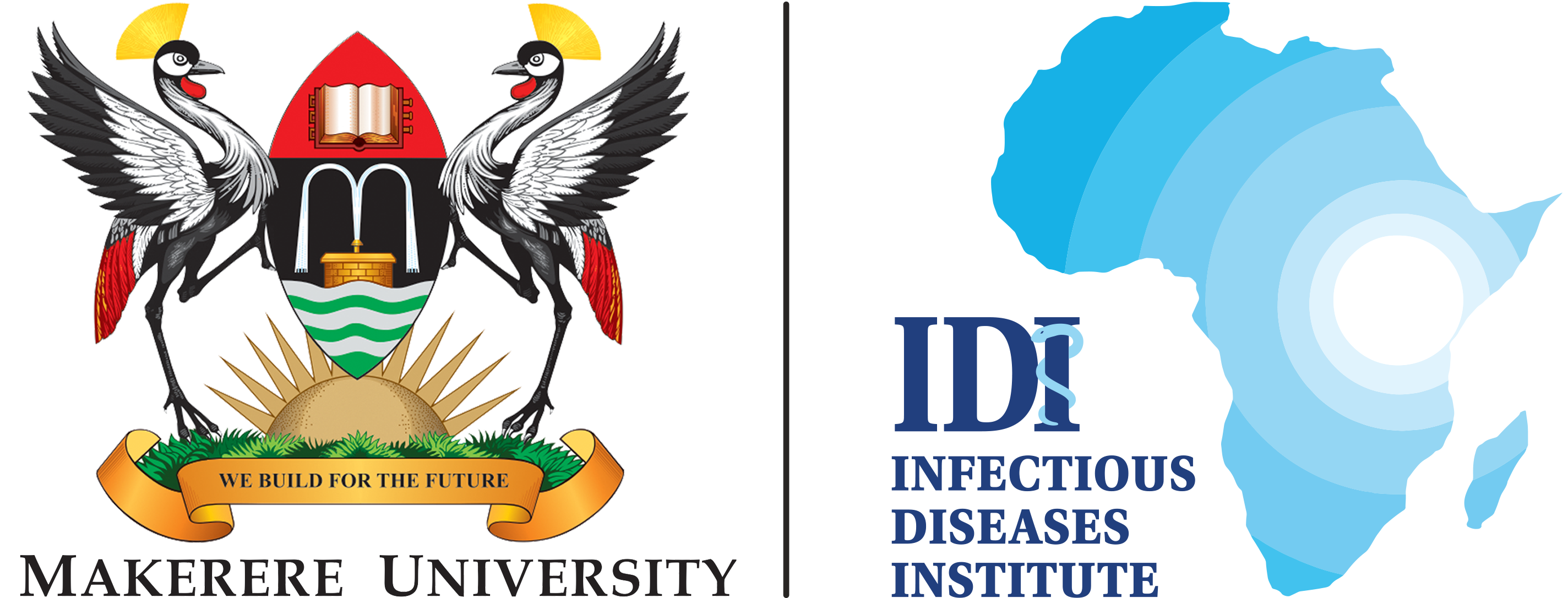- Associated Links
-
-
Our united network of partners and institutions share a vision for excellence, innovation, and impact. Together, we harness our combined strengths to create meaningful change.
-
-
-
- Careers
-
-
Our people are our greatest asset. We foster a thriving environment where everyone can flourish and make a difference. Join us in driving innovation and positive change through fulfilling career opportunities.
-
-
Research impact
The Infectious Diseases Institute (IDI) at Makerere University aims to produce and advocate for the translation of research findings into policy and practice in Uganda and Africa, with a strong emphasis on infectious diseases. This objective is achieved through various initiatives:
Research
IDI’s research programme focuses on disease-specific research questions, with the primary goal of publishing and advocating for the translation of research findings.
Research Portfolio
The Infectious Diseases Institute (IDI) has 151 active research grants across six core programs, including 15 clinical trials, with an annual budget of approximately US$68 million. The areas of growth in the portfolio include pharmacokinetics clinical trials and translational (lab-based) research.
Publications
The most visible outputs of the research programme are the number of peer-reviewed publications and abstracts presented at national and international scientific meetings. Since 2001, there has been a steady year-on-year growth in the number of publications and abstracts. As of December 2023, there were 1,390 peer-reviewed publications. In the past year, at least one third of these publications have had a research trainee at the institute as the first author, and up to two thirds of the publication have a trainee as the first-author or co-author. Significantly, a number of IDI publications have contributed to changes in international guidelines in the diagnosis and management of HIV/AIDS and related infections. The most recent contribution has been in the literature that led to the new World Health Organization Guidance on Screening Cryptococcal disease among severely immuno-suppressed individuals.
Collaborations
IDI collaborates with institutions based in the US and Europe, such as UCSF, and has been selected by the US National Institutes of Health (NIH) to host the African Centre of Excellence in Bioinformatics and Data-Intensive Science (ACE). The institute also contributes to the East African International Epidemiologic Databases to Evaluate AIDS (EA IeDEA) and the East African Consortium for Clinical Research (EACCR), which are collaborations that build capacity for TB research.
Database Collaborations
The Infectious Diseases Institute (IDI) has established long-term international research collaborations with major academic centres worldwide, including Johns Hopkins University, University of Washington, Harvard Medical School, Massachusetts General Hospital, University of California San Francisco (UCSF), University of Minnesota, University of Zurich, and many others.
These collaborations provide a widening global dimension to research at IDI. IDI is part of two major research database collaborations, including The East African International Epidemiologic Databases to Evaluate AIDS (EA IeDEA) research consortium, which uses observational databases to support research on different HIV manifestations and identify optimal treatment and prevention strategies in diverse resource-replete settings. Through this collaboration, the East Africa Regional Data Centre conducts periodic data quality and monitoring visits to offer guidance on quality to Investigators and Data Managers. IDI also contributes to the East African Consortium for Clinical Research (EACCR), a European and Developing Countries Clinical Trials Partnership (EDCTP)-supported initiative, and Training Health Researchers into Vocational Excellence in East Africa (THRiVE), a Wellcome Trust-funded initiative (under the Makerere University umbrella).
These collaborations have been strengthened through joint projects, concurrent faculty appointments, and fellowship and exchange programs, including Masters and Doctorate level student placements. Currently, IDI is contributing to the East African Consortium for Clinical Research (EACCR) and building capacity for TB research at St Mary’s Lacor Hospital in Gulu by supporting TB data management and laboratory upgrading
Health Economics and Outcomes Research
IDI is rapidly developing its internal capacity to conduct health economics and outcomes research related to infectious diseases that disproportionately affect sub-Saharan Africa. The institute has conducted studies in a wide range of areas, including tuberculosis therapy, early initiation of antiretroviral therapy, and the use of antiretroviral regimens for the prevention of mother-to-child transmission of HIV, among others. The Health Economics and Outcomes Research Group at IDI is responsible for conducting these studies. The group has collaborated with faculty and students of Makerere University to set up the Uganda chapter of the International Society for Pharmacoeconomics and Outcomes Research (ISPOR), which is now located within the IDI Research Office. The unit benefits from its presence through access to materials and joint training activities. IDI is part of two major research database collaborations, including The East African International Epidemiologic Databases to Evaluate AIDS (EA IeDEA) research consortium and the East African Consortium for Clinical Research (EACCR), which is a European and Developing Countries Clinical Trials Partnership (EDCTP)-supported initiative. Through these collaborations, IDI is building capacity for TB research at St Mary’s Lacor Hospital in Gulu by supporting TB data management and laboratory upgrading. The IDI cohorts encompass over 70,000 patients with routinely collected electronic HIV prevention care. The institute has a research program comprising over 40 projects, with over 500 articles in peer-reviewed journals.
Capacity Building
Training
Since its inception, the Infectious Diseases Institute (IDI) has trained more than 67,000 health workers from Uganda and 27 other African countries in HIV/AIDS and TB co-infection, malaria, lab services, pharmacy, systems, and more. IDI has translational research laboratories that focus on HIV, TB, and other infectious diseases, with the goal of linking basic science to bedside medicine in a resource-limited setting. The research findings are used to advocate for policy and practice changes that strengthen health systems in Africa. These efforts are part of IDI’s mission to strengthen health systems in Africa through research and capacity building.
Clinical Research Platforms
The IDI Research Programme has grown organically based on priority research questions for Africa, optimizing platforms of other programmes and partnerships to build capacity in key areas such as opportunistic infections (cryptococcus) and clinical pharmacology (pharmacokinetics). Through partnership, IDI’s HIV prevention clinical research, particularly among discordant couples and sex workers, has contributed to evidence leading to global drug approval for HIV prevention and revised protocols for use among discordant couples. The Research programme has solidified research platforms nationally in different regions and districts of Uganda where IDI operates, to suit a wide variety of research priorities. Here are some key clinical research platforms:
The Adult Infectious Diseases Clinic (IDC) at Mulago Hospital
The IDI flagship clinic at Mulago Hospital, Uganda’s national referral hospital, has offered and continues to offer access to over 7,000 HIV-infected patients, including those newly diagnosed, first-line, second-line, and third-line patients. Others are specialized clinics for special populations, such as HIV/TB co-infection patients, HIV-positive pregnant women, adolescents & young adults, and discordant couples. Research conducted in these clinics directly benefits from seamless access and proximity to all IDI systems, including excellent clinical facilities, statistics and data management, information and communication systems, and an in-house College of American Pathologists CAP-certified lab, among other things.
The Mid Western HIV Project
IDI implemented significant prevention, care, and treatment programs in the southwestern part of Uganda, particularly in the districts of Hoima, Buliisa, Kiryandongo, Masindi, Kibaale, Kagadi, and Kakumiro. As part of the Fogarty Scholars program, which paired foreign scholars with Ugandan partners, IDI built a clinical research site in this area and initiated a prospective observational cohort of over 1,000 people. Clinical endpoints included mortality, TB, cryptococcus, and immune recovery. Baseline cardiovascular information was collected in preparation for a potential longer-term longitudinal observational cohort.
Kampala Capital City Authority Clinics
The IDI supported the KCCA clinic network of 10 facilities to build capacity for prevention, care, and treatment of infectious diseases within Kampala City, with a population of approximately 3 million. The institute leveraged this relationship with KCCA to provide a clinical research platform that has been used by several projects, including projects implemented through the Infectious Diseases Network for Treatment and Research in Africa (INTERACT).
Gulu University and Lacor Hospital
The Infectious Diseases Institute worked with Gulu University and Lacor Hospital, located in Gulu district, to conduct research, particularly in tuberculosis. We spearheaded the performance of an environmental scan with Gulu University to determine how Makerere University College of Health Sciences’ strengths could be leveraged to strengthen research, service, and training for both institutions. This highlighted possible key areas of collaboration that culminated in three collaborative research initiatives focusing on laboratory capacity building, the creation of a TB electronic database at Lacor Hospital, and supporting the development of a Demographic Surveillance Site (DSS) by Gulu University with Swedish government support.

LISTINGS
For more information on IDI’s Research Programme contact,
Paul Gonza, Senior Research Manager
Email: research@idi.co.ug
Telephone: +256-312-307000

